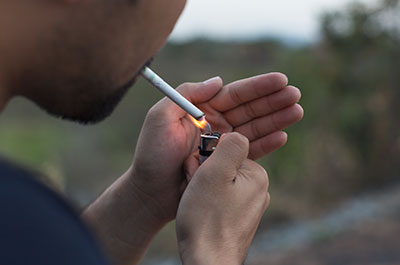While many have debated the health effects of cannabis, research continues to highlight the negative impacts of its use. In fact, a recent study has found a strong connection between using cannabis and an increased risk for heart attack and stroke. Here, Angelos Katramados, M.D., a neurologist for Henry Ford Health, explains how cannabis use (regardless of whether it was smoked, eaten or vaporized), can impact the body and increase your chances of serious health complications.
How Cannabis Affects The Body
As many states, including Michigan, have legalized the recreational use of marijuana products, surveys have found that a majority of adults (more than 75%) no longer perceive cannabis use as a significant health risk.
This may come from the popularized use of cannabidiol (CBD), a non-psychoactive compound of marijuana that has shown to have antioxidant, anti-inflammatory and even (FDA-approved) anti-seizure properties. Many people have turned to these products to help with health ailments from seizures, to chronic pain to sleep issues.
However, what many people don’t realize is that cannabis is not a single substance that stays unchanged. New strains of products have been developed to have different uses and over time, the potency of this drug has increased. In fact, the concentration of tetrahydrocannabinol (THC), the psychoactive compound of marijuana, continues to increase – from 3% in 1991 to 17% in 2017. Today, many strains of cannabis are made up of high concentrations of THC and low concentrations of CBD.
“While our understanding of the consequences of cannabis use is limited, it is rapidly evolving,” says Dr. Katramados. “There is evidence that using cannabis increases your immediate risk for a heart attack by almost five times as well as signals that cannabis use may increase your chronic risk of cardiovascular disease.”
According to the American Heart Association (AHA), the use of cannabis is not only associated with an increased risk for heart attack and stroke, but it can also impact your cognitive vitality.
“There is evidence of detrimental effects of THC use on memory, brain plasticity and neuron development,” says Dr. Katramados. “The effects of this have been observed at all ages – from prenatal exposure to older adults – though, it seems young people, whose brains are still developing, are particularly susceptible to the long-term cognitive effects of cannabis.”
Cannabis And Your Risk For Stroke

Stroke is one of the leading causes of disability and preventable death in the United States. While researchers can identify a real correlation between your stroke risk and marijuana use, its full effects aren’t completely understood yet.
“Marijuana may work with genetic and biological factors that would impact stroke risk from person to person,” Dr. Katramados says. “It may also work with other risk factors for stroke such as your blood pressure and cholesterol levels – potentially increasing the likelihood of these risk factors.”
Furthermore, there may be some connection between the act of smoking cannabis versus ingesting it in other ways. Experts do know that smoking tobacco and nicotine products increases your risk of stroke by increasing blood pressure, damaging blood vessels and exposing your body to possible carcinogens, so the act of ingesting or vaping marijuana may be similar.
“Smoking or vaping marijuana may cause users to consume a higher potency of THC than they realize, which can pose significant health risks,” says Dr. Katramados. “As for marijuana edibles, many of these products have a delayed onset, meaning your chances of over-consuming are much higher. At the very least, we understand that there are major cognitive effects when under the influence of these products – that is why it is against the law to drive under the influence of cannabis.”
Taking Control Of Your Stroke Risk
If you have used marijuana products in the past, there is still much to be learned about how that will impact your risk of stroke going forward.
“Whether a chronic risk remains is still to be determined,” says Dr. Katramados. “If the effects of cannabis are truly related to inflammation of the blood vessels, they are likely reversible. However, if future research finds a relationship between plaque buildups in the arteries and marijuana use, there may be an irreversible risk.”
That being said, there are many things that you can be doing to lower your risk for stroke in general. Dr. Katramados shares these best practices based on recommendations from the AHA:
- Eat a healthy diet
- Increase your physical activity
- Quit tobacco and nicotine (quitting marijuana is a good idea too)
- Optimize your sleep health
- Maintain a healthy weight
- Manage your cholesterol levels
- Take control of diabetes and high blood sugar levels
- Treat high blood pressure
“While cannabis use may be legal in some places, that doesn’t mean it is safe to use,” warns Dr. Katramados. “At this point in time, it is critical to continue with research and surveillance programs to understand the effects of marijuana use now and in the future.”
Reviewed by Dr. Angelos Katramados, a neurologist who sees patients at Henry Ford Hospital in Detroit.



